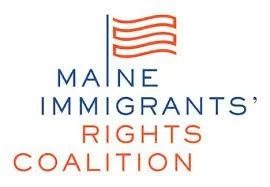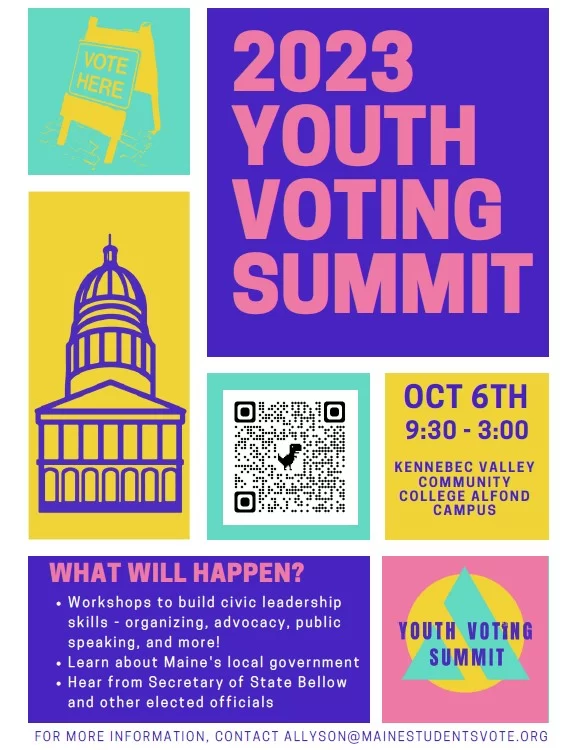Youth Take the Lead in Civic Engagement
Although the November 7th election was relatively low-key in Maine, there were still highly consequential races and ballot initiatives to be determined. As a result, we saw a flurry of voter engagement, education, and mobilization efforts across the Bates campus, the City of Lewiston, and the State of Maine.
In the week prior to the election, we hosted two important events at Bates – a Ballot Referendum Forum featuring Secretary of State Shenna Bellows and Kate Cough of The Maine Monitor, co-sponsored by the Harward Center and Muskie Archives; and a Candidate Forum organized by the Harward Center, Maine Students Vote, Community Organizing Alliance, and Maine Immigrants’ Rights Coalition. Both events were well attended and did a great job of informing voters about what and who were on the ballot.
Within the academic curriculum, a course that has been highlighting civic engagement throughout the Fall semester is Professor Elena Maker Castro’s new community-engaged course, Psychology 379: The Development of Youth Community Engagement. In this course, students work in small groups with community partners who focus on the civic development of local youth. Partner organizations included Maine Student’s Vote (MSV), a nonprofit organization that “encourages young people to become democratic leaders and life-long civic champions in their communities” (mainestudentsvote.org, 2023). As part of their work in Dr. Maker Castro’s course, four students (Ainsley Fiske, Lane Foushee, Morgan Kennedy, and Kay Cochran) have been collaborating with MSV staff and the youth organizers of the Maine Youth Voting Summit to support their work by conducting an impact assessment of the summit.
The Maine Youth Voting Summit is an annual day-long gathering of youth from Maine high schools and colleges, featuring workshops and speakers designed to build the civic leadership skills and capacities of Maine’s youth. This year, summit workshop topics included the future of Trans liberation in Maine, the stakes of Question 6 for the Wabanaki people of Maine, and a tutorial on how to write testimony and talk to your legislators. Speakers included Secretary of State Shenna Bellows and Representative Nathan Carlow.
Ainsley Fiske, a sophomore Psychology major from Albany, NY, described PSYC 379 as “exactly what I was looking for in a class,” sharing that she grew up in a civically minded environment thanks to her parents, who instilled the value of engaging in one’s community from a young age. Fiske recalled spending time as a youth volunteering at food banks and shelters with her mother; she and her peers were also enthusiastic Girl Scouts. Through Maker Castro’s course, Fiske has been able to reflect on her own experiences through the lens of developmental psychology, asking questions such as: How do the roles of school, peers, and parents differ or overlap in their influence on a young person’s inclination to be involved in their community? “In middle and high school you’re following the actions laid out for you, for the most part,” Fiske reflected, “but this project has been a chance to move beyond that.”
Fiske and her fellow group members developed a pre and post survey that was shared with Maine Youth Voting Summit attendees in an effort to understand the impact of the Summit on the education and empowerment of its participants. It stood out to Fiske that in the planning meetings she attended, while there was a staff member present from MSV, the youth organizers were the primary drivers of the conversations: “Allyson [from MSV] was there to jump in where needed, but the high schoolers and college students were the ones giving feedback and were clear on wanting to know the impact of their work.” Fiske also learned a great deal about the upcoming ballot initiatives and related community issues from the MSV youth, giving kudos that “It was very impressive to see how well informed they were about all the issues.”
Dr. Maker Castro also attended the summit alongside her students and shared a similar appreciation for the work of the youth: “I loved attending the Youth Voting Summit!” she shared. “I was inspired by both the young people and their adult allies. I was moved by conversations we had about what equity and justice look like in the Maine context, and I believe it inspired all of us to think critically about how we can be civically engaged in ways that build a stronger, more equitable and just state.” Youth civic development is a core focus of Dr. Maker Castro’s own research. When asked what drives this focus, she explained, “Civic development often gets overlooked when we think about schools and child/adolescent development more broadly. I argue that civic development is a key developmental capacity where young people are able to develop their sense of belonging and purpose, and where they can engage in the critical work of challenging and transforming societal inequities.”
Here at the Harward Center, we certainly agree with Dr. Maker Castro on this point! Especially as we all look for ways to cope and find hope on the heels of the recent tragic loss of life in our community, the sense of purpose we can find in community engagement is profound. Ainsley Fiske considered this as she reflected on her role as a teacher aide in a local kindergarten classroom. The shiny blue heart sticker on her sweater when we sat down to talk about PSYC 379 and Maine Students Vote indicated that she had just returned to the classroom for the first time since the mass shooting. “I think a return to routine was helpful for everyone,” she considered. “It was really nice for me to see [the kids]. I was talking to my host teacher while everything was happening … but it was good to actually see [the kids] and see that, for the most part, in this moment, they’re just happy to be back together.” Similar appreciation for the ability to gather safely, as well as to engage in discussion of pressing issues, has been shared across the board at voter engagement and education events recently.



